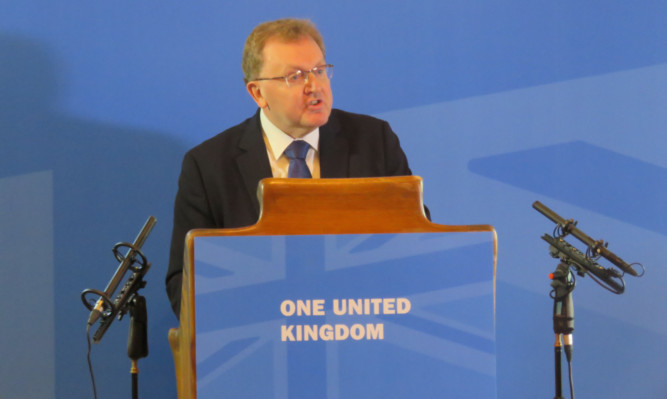Scotland will have one of the most powerful devolved parliaments in the world when measures enshrined in the new Scotland Bill come into force in 2016.
However, presiding over such extensive devolution is a government with a mission to bring every corner of the country under its centralising control.
While the rest of the UK is undergoing a regional revolution, with Westminster setting free the great northern cities of England to run their own affairs, Scotland increasingly favours Soviet-style dominance by its Holyrood executive.
This iron grip of SNP ministers over all aspects of domestic policy risks consigning the country to a 1990s time warp, said the Scottish secretary David Mundell in a speech in Glasgow on Monday.
Cities and towns are losing out as the SNP hoards power, he said, as he outlined an alternative vision for Scotland, with local authorities given jurisdiction over areas such as health, transport and policing, while towns and villages could also take more control over their own affairs.
Whatever your politics, or your views on state autocracy, there is no denying the claims made by Mundell about the Nationalists’ power grab.
During the independence referendum last year, the Western Isles, Shetland and Orkney wanted a separate plebiscite on remaining part of Scotland in the event of a Yes vote.
Politburo politics
Isolation from the politburo politics of Edinburgh is as great among many of the people in these islands as it is from London and there is little enthusiasm for the SNP’s separatist agenda.
However, a petition lodged at Holyrood last year to give islanders a greater say in their future was dismissed by the Nationalists, with the-then First Minister Alex Salmond accusing the Shetland MSP Tavish Scott of “mischief making”.
So much for devolution.
More widespread disillusionment over SNP centralisation has been crystallising in Scotland’s 32 local authorities as their budgets have been progressively squeezed.
Finance Minister John Swinney’s recent autumn statement appeared to be something of a final straw when, for the ninth year running, council tax was frozen.
A 7.2% cut in town hall funds would be “catastrophic” for local jobs and services, warned city leaders.
Scottish councils owe more than twice as much per head as English and Welsh local authorities, according to a report in the Guardian, equal to debts of £6,166 per household, compared with £3,100 per home in England and £2,825 per household in Wales.
Not only do ministers oversee local tax levels but they micro-manage (mostly unsuccessfully) hospitals, police departments, regional development agencies and fire services.
Cosla, the councils’ umbrella group, has called Scotland “the most centralised country in Europe” and its leader David O’Neill has threatened to defy Swinney’s latest attempt to tie his members’ hands.
The contrast with England’s major cities could not be more pronounced.
Manchester city fathers, for example, will gain control of the region’s £6 billion health and social care budget in George Osborne’s devolutionary drive.
“The Northern Powerhouse is breaking new ground”, said Mundell.
“And now that the Midlands Engine is gaining pace, with plans for a similar transfer of power to the Greater Birmingham area, as well as plans afoot in urban Yorkshire, suburban Hampshire and even rural Cornwall, the direction of travel for the rest of the UK is becoming crystal clear.
“There is now real risk Glasgow, Edinburgh, Aberdeen, Dundee and indeed, the towns and counties of Scotland as a whole, will be left behind.”
Obedience
The motivation of the SNP in emasculating the regions is obvious.
While the Nationalists can enforce tight party discipline over their own MSPs, they cannot guarantee obedience from councils dominated by other parties.
So it doles out largesse from central coffers winning over voters with its council tax freeze and free, non-means-tested university tuition (though this mainly benefits the middle classes), while robbing regional bodies of the means to deliver the most basic public services.
The upshot is that the Holyrood regime is seen as the government that keeps on giving, while cash-strapped councils must oversee drastic cuts on the front line.
The electorate has yet to see through this ruse, which has catapulted the SNP to successive victories at the ballot box.
However, the pace of reform in England’s regions is throwing Scotland’s shortcomings into much sharper focus.
A report in the Economist magazine in October blamed the SNP’s “underperformance” in power on its centralising formula.
“It amounts to a style of government that is more akin to Argentina’s Peronists than to the reformist Scandinavian social democrats to whom SNP politicians flatteringly compare themselves”, it said.
Of course, the Nationalists are only interested in one thing: independence. If centralisation suits this political goal more than it suits Scotland, too bad. In pursuit of its dream, that is a price the SNP is prepared to make us all pay.
